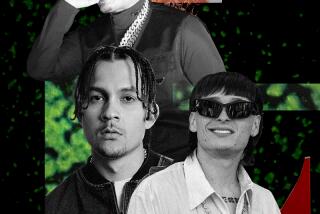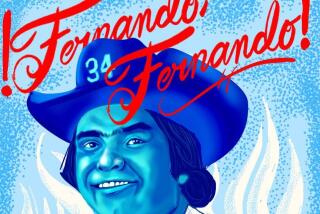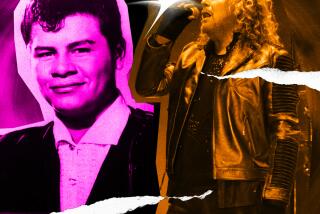Lots of talk but no words
- Share via
OROEL, SPAIN — When Spanish schoolchildren sing their national anthem, they particularly love the line about Generalissimo Francisco Franco and his “white rear end.”
OK, so those aren’t the real lyrics. Because there aren’t any.
Spain is one of the few countries that have a wordless national anthem. Popular culture, including the bawdy ballad that children famously sing to the anthem’s melody, has tried to fill the void.
But now, putting words to the music has become the latest friction in a conflict over how to express Spanish identity at a time of increasingly polarized politics and heightened regional divisions, and when it seems the old tensions of the left-right civil war are being revived.
Alejandro Blanco, president of Spain’s Olympic Committee, recently took up the cause. He was tired of watching Spanish athletes win international competitions and mount the victory podium only to remain tight-lipped as their national anthem was played.
Or, perhaps worse, they’d hum and mouth noises, a kind of na-na-nanana, at what should be a moment of supreme patriotism and glory.
“Spanish sportsmen want to feel as proud as the French, the English,” Blanco said as he launched a competition for the public to submit lyrics. Sports, he reasoned, could be a unifying force.
But in a country with strong regional loyalties and a history of intense political divisions, agreeing on a set of words that pleases (or at least doesn’t offend) the majority of Spain’s citizens could prove impossible.
Domingo Murillo, a 76-year-old retired airplane manufacturer, is a prime example of why the project is likely to be so difficult.
On one late-summer evening of family celebration in this far corner of northern Spain, before a table heavy with the region’s meats, pates and maroon-colored wines, Murillo rose to sing a patriotic anthem.
Voice choked with emotion as he sang the old traditional song, he serenaded the Pyrenees, “the thing that unites us.” His song ignored borders and followed the land, the rivers and the snow-capped peaks.
“Montañas Pirineos,” he intoned, “sois mi amor.” Pyrenees mountains, you are my love.
“Nada es mas grande que mi patria, nada es mas bello que mi amistad.” Nothing is greater than my homeland, nothing is more beautiful than my friendship.
For Murillo, the poetry about these mountains means more than any other anthem.
“I don’t know the Spanish national anthem,” he said. “Those symbols are not important to me.”
Whether it’s those kinds of regional affections, or raw political differences, the debate over the anthem is dividing public opinion.
The main opposition Popular Party, from the right wing, complains that the Socialist government ignores and belittles symbols of patriotism in the name of progress and in its eagerness to curry favor with Spain’s diverse regions, from the Basque country and Galicia to Catalonia and Andalucia.
The government counters that the Popular Party wants to own patriotism and appropriate its symbols, from the flag to the coat of arms, for partisan purposes.
--
The national anthem began as a military march in the mid-18th century, endorsed by King Charles III. Known first as “The Grenadier March” and later “The Royal March,” the symphonic and rather uplifting melody continued in use -- wordlessly -- for generations until becoming caught up in the Spanish Civil War.
In 1931, the left-leaning Second Republic chose a different, less militaristic anthem. After Fascist Gen. Francisco Franco toppled the elected government in a bloody coup in 1936, touching off three years of fratricidal war, he reverted to the original anthem -- and added lyrics that exalted Spain’s “victory” and “resurgence.”
The words were seen by many Spaniards as heavy-handed, certainly a reminder of a dark period, and were dropped after Franco’s death in 1975 as the country began its transition to democracy.
Now Blanco, of the Olympic Committee, has become the latest of a long string of aspiring sponsors of lyricists.
The Popular Party seized on Blanco’s initiative, welcoming it and promising to set up a parliamentary committee that would ultimately approve the lyrics. A commercial television network, Telecinco, joined in, inviting proposals from viewers. Hundreds of people responded, and in blogs and newspaper columns, debate raged over whether it wouldn’t be better to leave well enough alone.
The case of Murillo, the man enamored of the Pyrenees, may be extreme: The civil war drove his family from Spain, over the mountain range and into exile in southern France. So his attachment to national symbols might be more tenuous than most. But his ambivalence is echoed throughout this fragmented, diverse country.
“Putting words to the anthem now would be false -- like wearing a hairpiece,” said Eva Higueras, 23, a computer science student from Getafe, a suburb of Madrid. “ The anthem is emotional the way it is, and it’s not going to be more so if words are added.”
Alejandro Martin, 28, of Malaga, also opposes adding lyrics.
“It’s a national feature for Spaniards not to agree on anything, and it would be difficult because of the regionalisms,” Martin said. But as a feature of “national identity,” he added, the anthem, wordless, remained very important. “I feel a lot of pride when I hear the anthem,” he said.
Mother and daughter Monica San Gines, 55, and Leticia Martinez-Avial, 25, seated in a park near the Royal Palace in Madrid on a late summer evening, disagreed on whether the anthem should have words. San Gines would like lyrics but her daughter said, “Why add them?”
“It depends how you look at it,” said the mother. “We Spaniards like to party, and I can just imagine how much fun it would be for a group of Spaniards to sing their lungs out, singing the words of the national anthem together. But, on the other hand, it would mean breaking up a long-standing tradition.”
They also disagreed on whether Spaniards would ever agree on lyrics for the anthem.
--
San Gines had some ideas about the words. “They should talk about the nation and include all Spaniards, with no distinction between one region or another.”
Martinez-Avial was not convinced. “There are too many conflicts, with the Catalonians, the Basques. . . . We don’t agree on things.”
Enrique Ferrero, a 45-year-old sales representative from Segovia, thought an anthem with words was a “fabulous” idea. “Spain should be more united,” he said, and the anthem “should talk more about unity.”
Manuel Montero, a columnist writing in the El Pais newspaper, ticked off the long list of regional anthems adopted for seemingly every region, city, hill and dale.
“Few things are as perplexing in Spain as the lyrics of so many autonomous anthems. . . . It’s no wonder that the citizens go into rapture and lose themselves,” Montero wrote. “Spain paints rather curious pictures when it comes to its hymns. That’s why we must tremble before the idea of putting words to the anthem of Spain.”
Jose Maria Bellon, a spokesman for Blanco, the Olympic Committee president, said he hoped the new verses would “unite athletes and their fans” without concern for politics. “If later it serves to unite the people” more broadly, he added, “then that’s great.”
The various entries received by the Olympic Committee are being turned over to the General Society of Authors, which has experts who can adapt the proposals to the technical rigors of “The Royal March.” A selection, which the parliament would eventually review, could come as early as next month.
Meanwhile, Telecinco, the television station, conducted an online poll and came up with its winning entry, by the poet and journalist Enrique Hernandez-Luike. It’s a piece of “simple metaphors and accessible musicality,” Telecinco said.
It opens with a paean to “Mother Homeland, arms entwined in a sign of peace,” and invokes the flag, freedom, the constitution, “an ensemble of cultures” and “the hand of Europe.”
One thing it does not mention: Spain.
--
Special correspondent Cristina Mateo-Yanguas in Madrid contributed to this report.
--
(BEGIN TEXT OF INFOBOX)
Putting words to the music
Times translation of the winning entry in the Telecinco contest, by Enrique Hernandez-Luike:
Mother homeland,
arms linked
in a sign of peace,
our voices raised.
All your children
at the foot of the flag
and in freedom,
with the Constitution.
Art and strength,
combination of cultures
firm pedestal
of a triumphant people.
Hand of Europe
outstretched to the whole world,
bow in the sea
to the wind of Love.
Times translation of lyrics favored by Franco, written by Jose Maria Peman:
Long live Spain, raise your arms, sons
Of the Spanish people
Who have returned to rise again.
Glory to the fatherland that knew how to follow,
Over the blue of the sea, the march of the sun.
Spain triumphs! The anvils and the wheels
Sing to the rhythm
Of the hymn of faith.
Together with them let us rise and sing
Of the new life, strong with work and peace.
More to Read
Sign up for Essential California
The most important California stories and recommendations in your inbox every morning.
You may occasionally receive promotional content from the Los Angeles Times.











